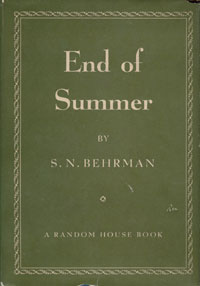|
 |
End
of Summer
S. N. Behrman
New York:
Random House, 1936
First edition in dust jacket |
| One would like to think of Behrman’s next
play,
End
of Summer, as a tongue-in-cheek
response by the playwright to the reception of the serious
Rain From Heaven, by placing the
same work on American shores and in the framework of a
light, comedic format that critics and public alike
preferred to receive from this playwright. Numbering among
the characters are the Russian émigré Boris (who resembles
Count Tolstoy, son of Leo); a Fascist, Dr. Rice; the
anarchist-Catholic-Communist Dennis McCarthy; and the
isolationist-nonaligned Leonie, whose personal curse is
always to fall in love with the wrong man. Providing support
from the background as pioneering capitalists are Leonie’s
mother, Mrs. Wyler, and Leonie’s ex-husband, Sam. There are
the uncommitted young people, highly educated but without
jobs during the Depression and leaning toward social reform;
and finally Dr. Dexter, a scientist who, as an earlier
Werner von Braun, rises above politics to pursue pure
scientific inquiry. The manuscript presages a melodrama akin
to Patrick Hamilton’s long-running mystery play,
Angel Street (1941): the Fascist
Dr. Rice was to narcotize the vulnerable Leonie into a
constant stupor, then death, whereupon he would inherit her
wealth. Behrman details this same plot in his only novel,
The
Burning Glass (1968). Behrman’s
representation of capitalism, which has Chekhovian
overtones, offers Leonie Frothingham’s summer place in Maine
as something of a rock of salvation, a catchall for the
under privileged set adrift in an ocean of economical and
political upheavals that would ultimately result in World
War II. Leonie falls victim to the exploitive Dr. Rice, an
opportunist adventurer. Her daughter Paula, however, exposes
Rice’s flagrant inconstancy. The flirtatious Leonie consoles
herself with the far leftist, Dennis McCarthy, who predicts
the coming of a millennium. The play’s ending proved vexing
as the production moved from one tryout city to another. The
sharpest rebuke came from Boston’s critics just prior to the
company’s move to Broadway. It now seems likely that if the
play had not been recast with the dynamic and sexually
attractive Van Heflin in the role of Dennis McCarthy,
Behrman would not have developed his satisfying – if
slightly ominous – conclusion, consistent with the balance
of the play, in the eleventh hour. The predicted millennium
never achieved realization, of course, though the period did
witness the passing of the old order to a large degree.
Fortunately Behrman’s original ending, that of Fascist
dominance, never materialized either. The invaluable
presence and assistance of Ina Claire once again resulted in
one of Behrman’s best-crafted scripts, and it came to be his
favorite play, the one he considered his best written. In
the summer of 1977, Public Broadcasting Service aired the
Asolo State Theatre production of
End
of Summer on the "Great
Performances" series. Helen Hayes appeared as Mrs. Wyler. |
|